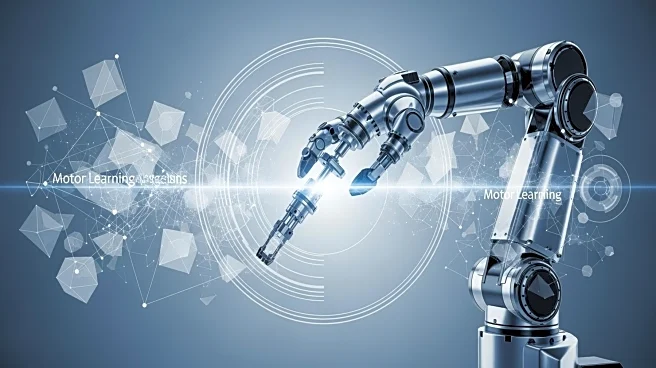What's Happening?
A recent study has explored the impact of feedback manipulations on motor learning mechanisms in a real-world task involving a pool game. The research utilized a combination of physical and virtual reality environments to assess how participants learn motor skills
when feedback is altered. Participants engaged in a pool game while receiving different types of feedback—error-based and reward-based—through a virtual reality setup. The study found that even when reward feedback was removed, participants continued to engage in 'reward-like' learning, suggesting that they found sufficient motivation in observing the correct ball trajectory. This indicates that participants rely on a holistic learning process that incorporates various environmental cues and internal computations, rather than solely depending on single learning mechanisms.
Why It's Important?
The findings of this study have significant implications for understanding how humans learn motor skills in real-world settings. By demonstrating that motor learning mechanisms are not significantly altered by changes in feedback, the research suggests that individuals can adapt to different learning environments and still achieve skill acquisition. This has potential applications in fields such as sports training, rehabilitation, and education, where understanding the nuances of motor learning can lead to more effective training programs. The study also highlights the importance of considering multiple feedback sources in learning processes, which could influence how training and educational programs are designed to maximize learning outcomes.
What's Next?
Future research could explore the application of these findings in various domains, such as sports and rehabilitation, to develop more effective training methods. Additionally, further studies could investigate how different types of feedback influence learning in other real-world tasks, potentially leading to broader applications in education and skill development. Researchers may also look into the neural mechanisms underlying this holistic learning process to better understand how the brain integrates different types of feedback during motor learning.
Beyond the Headlines
The study's use of virtual reality to simulate real-world tasks opens up new possibilities for research in motor learning. This approach allows for precise control over experimental conditions and the ability to manipulate feedback in ways that are not possible in purely physical environments. The integration of EEG data to monitor brain activity during the tasks also provides insights into the neural processes involved in learning, which could lead to advancements in neurorehabilitation and cognitive training.















